Tutorful is a UK-based online tutoring marketplace that connects students and parents with private tutors. It launched in 2015 and now claims 150,000+ users and over 11,000 tutors. This article reviews Tutorful’s offerings, user feedback, pricing, and how it works. We also compare Tutorful to alternatives, especially My Engineering Buddy (MEB), and cover Tutorful’s company info, pros, cons, and FAQs.
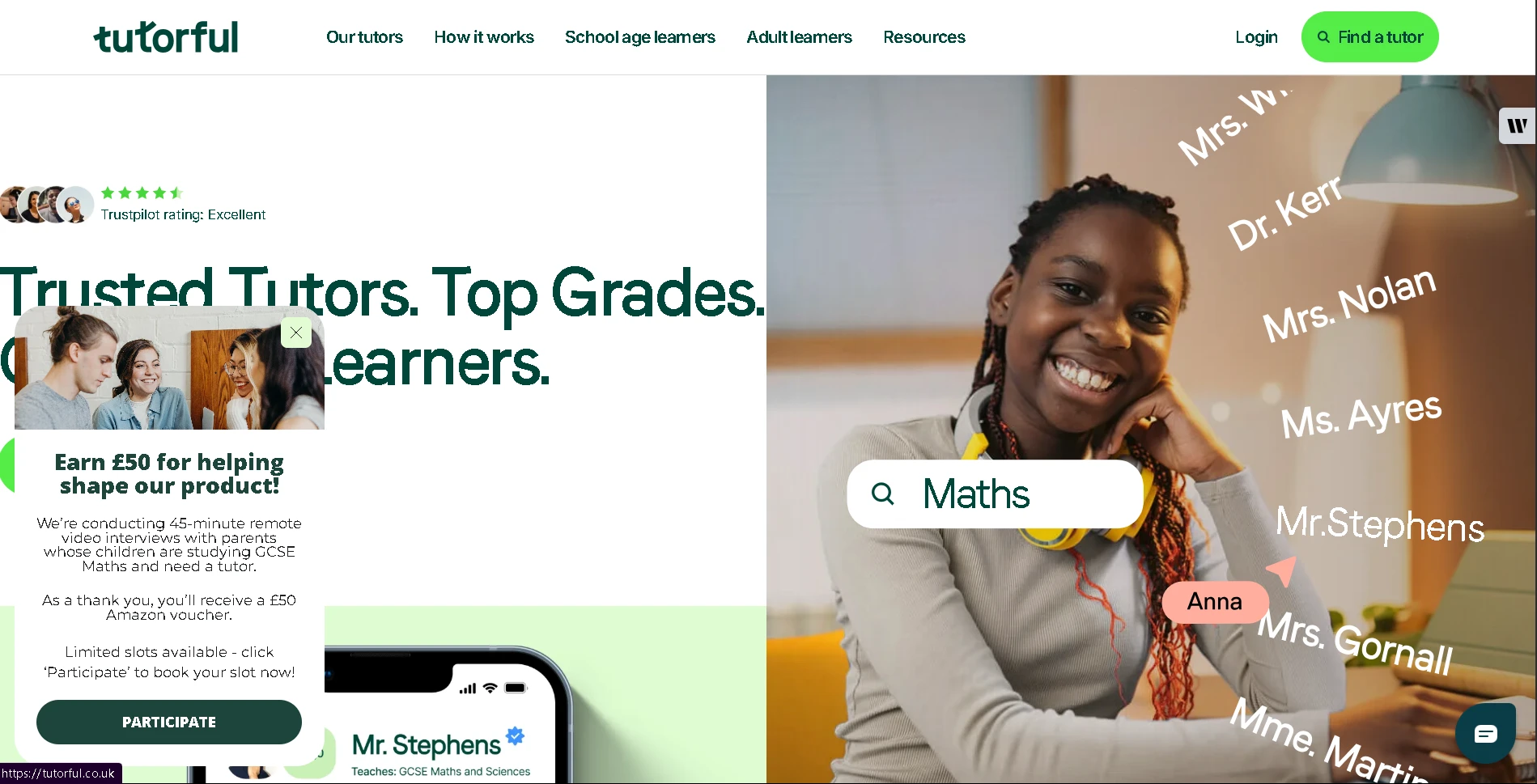
Tutorful Reviews and Testimonials
On review sites, Tutorful has good marks but some mixed feedback. For example, Trustpilot rates it about 4.5/5 with thousands of parent and tutor reviews. Many users praise the platform for offering high-quality tutors and easy booking. Tutorful’s own site shows testimonials like “Excellent tutor, very patient” and “Excellent online tutoring”. In contrast, employee/tutor reviews on Indeed average 3.1/5 uk.indeed.com (11 reviews) and Glassdoor around 3.3/5 (tutors).
Common positives are tutor quality, flexible scheduling, and no upfront fees. Tutors say they can set their own rates and Tutorful handles payments. The platform also guarantees a great first lesson: if unsatisfied, Tutorful pays for the next lesson with a different tutor.
Common complaints include high fees and tech hiccups. Many tutors note Tutorful’s service fee is large (tutors keep only ~60–75% of what students pay), tutorful.tenereteam.com. A few mention booking delays or internet issues during online lessons. Overall, Tutorful is viewed as a legitimate service (backed by investors and millions of lessons) with generally positive ratings on Trustpilot.
Is Tutorful legit? Yes. Tutorful is a well-established UK company (founded 2015 finsmes.com) with millions of lessons completed and high user ratings on play.google.com. It is funded by investors and has a formal customer support structure. The majority of reviews see it as trustworthy, though they advise users to be aware of fees.
Summary: Tutorful is widely used (150k+ students) and highly rated by parents on Trustpilot. Its tutors are vetted and reviews are mostly positive about teaching quality. However, some tutors and parents complain about Tutorful’s high platform fees and competitive market. In short, Tutorful is generally liked by customers, but keep an eye on costs and tutor availability.
Tutorful Pricing
Pricing Range
Tutorful lets tutors set their own hourly rate, so prices vary by subject and experience. Tutorful guidance notes tutors often charge £15–20/hr when starting, £20–35/hr for more experience, and top tutors even more. In practice, Tutorful reports an average session price ~£37.45/hr, and students typically pay £20–45 per hour. Rates tend to be lowest for younger grades and higher for A-levels or degree tutoring.
In context, independent research finds UK private tutors average ~£35–40/hr tutorcruncher.com, so Tutorful’s pricing is in line with market rates. Subjects like physics or languages can go higher. Keep in mind Tutorful adds a service fee on top of the tutor’s rate (so what the student pays is higher).
Tutorful also charges a platform commission on each lesson. Officially this is called a “service fee,” but tutors report losing about 20–35% of each lesson price to Tutorful. For example, one tutor said Tutorful takes a 35% cut of lesson fees. In other words, if a student pays £30/hr, the tutor might only receive about £20 and Tutorful keeps the rest. This commission covers Tutorful’s costs.
What Students Say About Tutorful Pricing
Students and parents generally find Tutorful’s prices reasonable for quality tuition. Reviews on forums note that £20–45/hr is typical for online tutors, matching what one would pay in other services or private tutoring. Tutorful’s range aligns with the industry average of ~£35–40/hr, Some parents say the price is fair given the vetting of tutors, while others feel it’s on the higher side, especially when factoring in Tutorful’s added fees. Overall, there’s no consensus complaint about price — it’s generally seen as market-standard.
Hidden Costs
Tutorful has no sign-up fee or subscription for students or tutors. However, students should watch out for late-cancellation fees. If a lesson is cancelled more than 24h before the start, there’s no chargefor. But cancelling within 24h can incur 50–100% of the lesson fee, at the tutor’s choice support.tutorful.ie. Even if the tutor waives most of the fee, the student still pays a fixed £5 “late cancellation” fee support.tutorful.ie. In short: cancel early to avoid charges. There are no extra “material” or registration fees.
How Tutorful’s Pricing Works
Students pay by credit/debit card . When you book a tutor, you enter your card details and authenticate; Tutorful only charges the card 24 hours after each lesson ends. support.tutorful.co.uk. There is no need to pre-pay or subscribe. New students often get a welcome credit: for example, Tutorful advertises a £25 credit toward the first lesson for signing up. Other promotions or referral credits may occasionally be available. There are no group discounts or subscriptions by default – each session is paid individually.
Free Trial
Tutorful does not offer a free trial lesson in the usual sense. Instead, it has a first-lesson satisfaction guarantee. If a student isn’t happy with their first tutor, Tutorful will pay for the next lesson with a different tutor. This means the second lesson is essentially free. But to claim this, you must notify Tutorful within a short time after the lesson. So while there’s no unlimited trial, this guarantee lets students try another tutor at no extra cost if the match is poor.
Refund Policy
Tutorful’s refund policy is spelled out on its site. If a scheduled lesson is cancelled properly (e.g. by Tutorful or the tutor), students can request a refund of the lesson cost at support.tutorful.co.uk. The student has a couple of days to request it through their account page, Tutorful will then ask the tutor to confirm the cancellation. If confirmed (or if the tutor doesn’t respond in time), the student is refunded. Refunds take a few days to process back to your card. If a student cancels late, refunds depend on the tutor’s chosen cancellation charge (usually partial refund). Overall, Tutorful’s policy is transparent, but some users say they had to follow up to ensure the refund was issued.
Tutorful Alternatives
Students may look at other services if Tutorful lacks tutors in a needed subject, if prices seem high, or if they want different features. Notable alternatives include:
-
My Engineering Buddy (MEB) – An online tutoring service focused on engineering and STEM subjects. MEB serves students in the US, UK, Canada, Australia, Gulf and beyond in.linkedin.com. They promise “premium yet affordable” tutoring, claiming over 10,000 students helped and 97% satisfaction in.linkedin.com. MEB highlights personalized attention for homework, projects, and test prep in the engineering field.
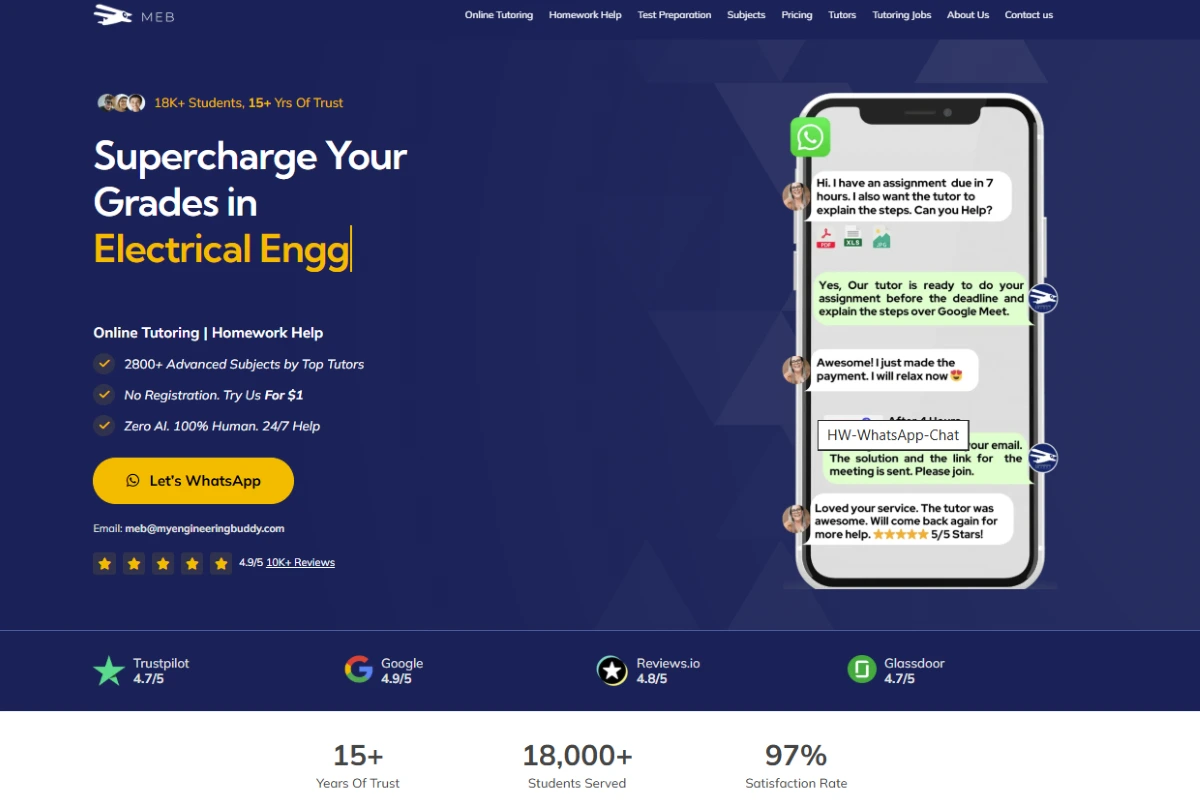
-
MyTutor (IXL) – A UK-based platform now part of IXL Learning. It’s often cited as “the UK’s leading online tutoring platform”. MyTutor has delivered millions of lessons (4M+ as of 2013) and focuses on vetted university-level tutors. It covers many school and A-level subjects.
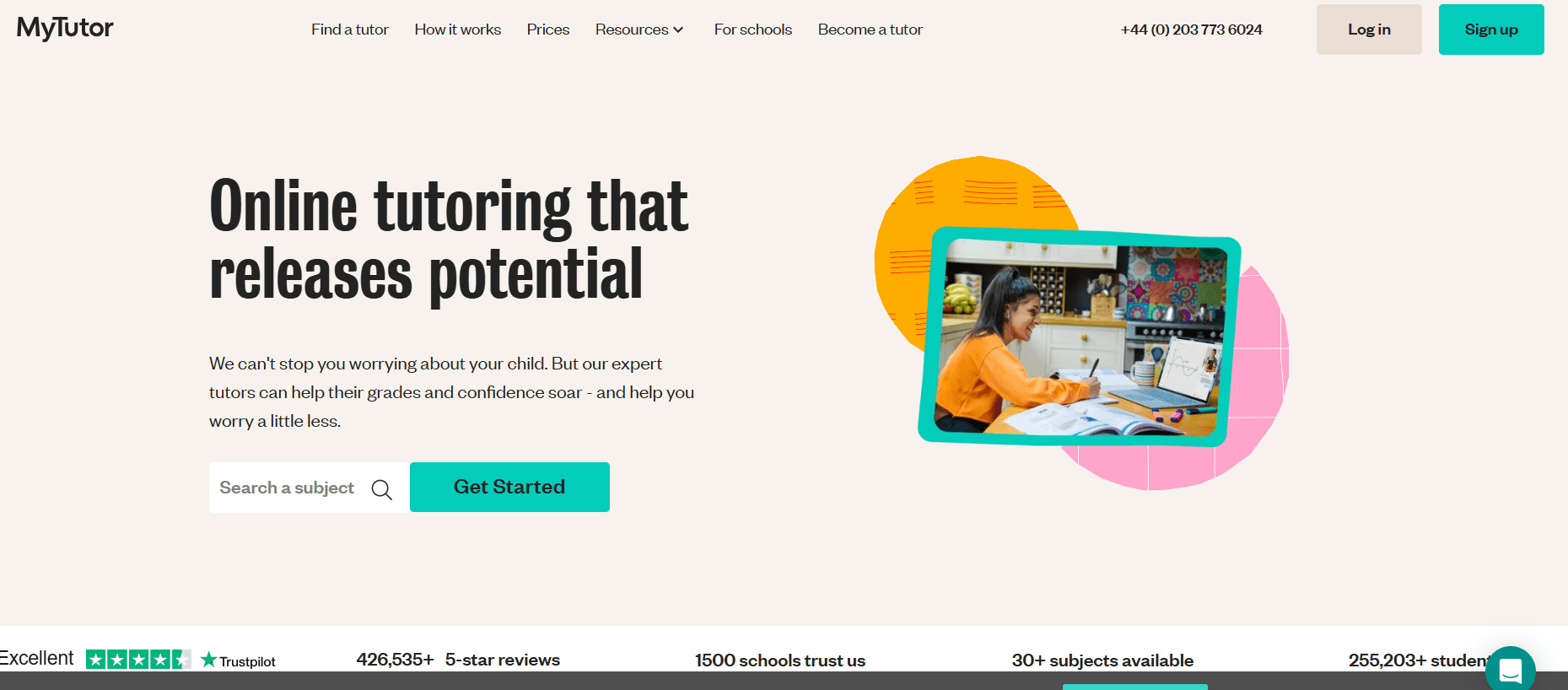
-
Wyzant – A US tutoring marketplace (IXL brand) described as “the largest tutoring network in the United States”. Wyzant offers tutors in a wide range of subjects, mostly for American curricula. Rates vary widely; Wyzant charges a sliding commission.
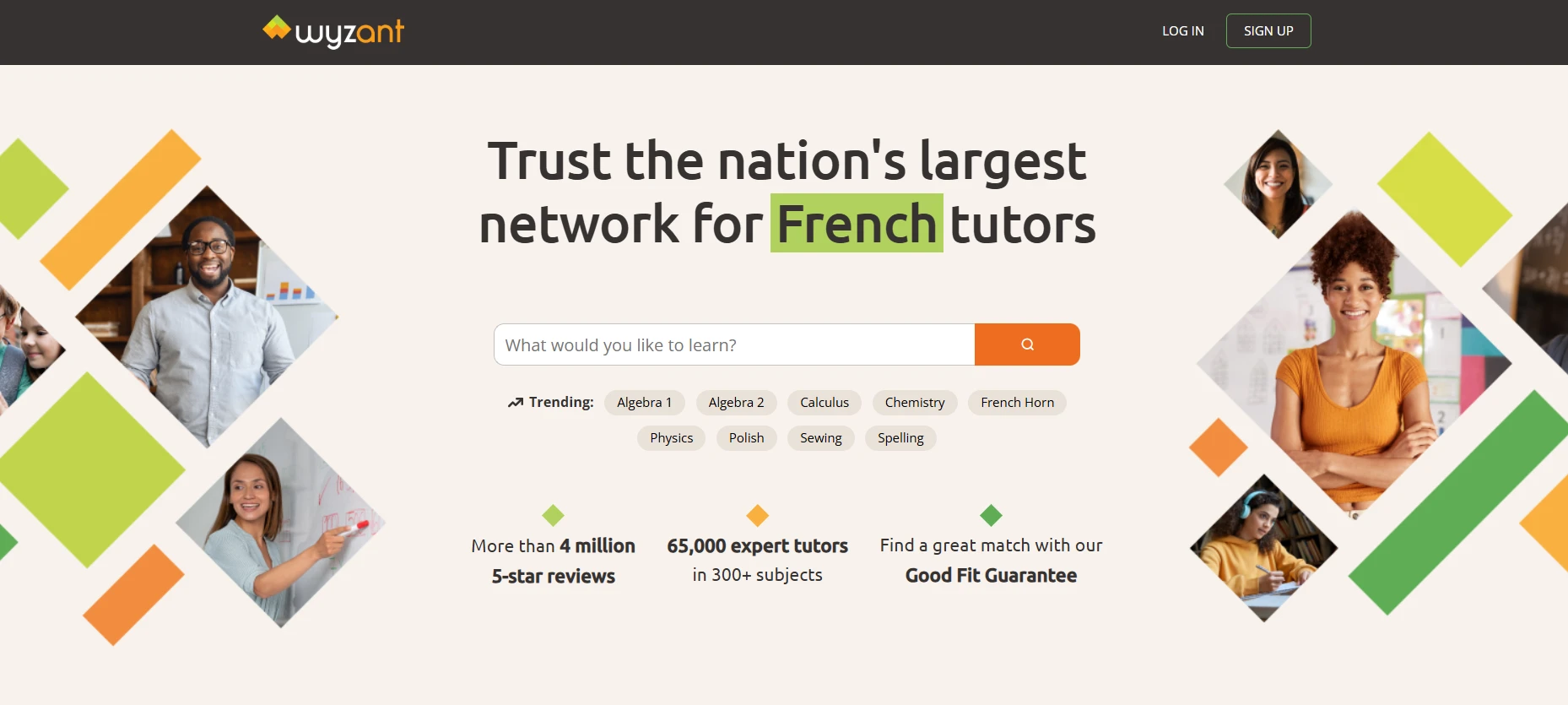
-
Chegg Tutors (Chegg Study) – A US-based homework help platform where students can pay per question or session. It focuses on math/science and offers subscriptions.

-
Superprof / Preply – Global platforms. Superprof (France-based) connects tutors and takes a small fee per booking. Preply emphasizes language learning and has per-minute pricing.
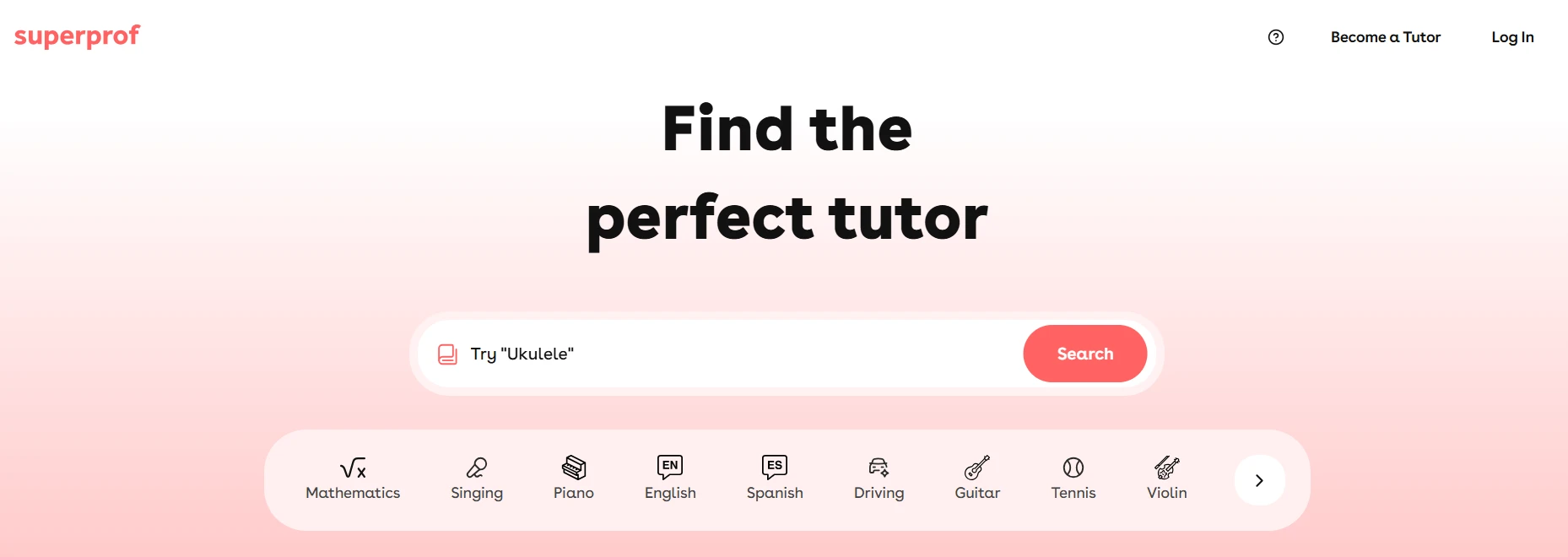
-
Khan Academy / Free Resources – While not one-to-one tutoring, these free sites offer lessons on many academic topics, which may reduce the need for paid help in some cases.
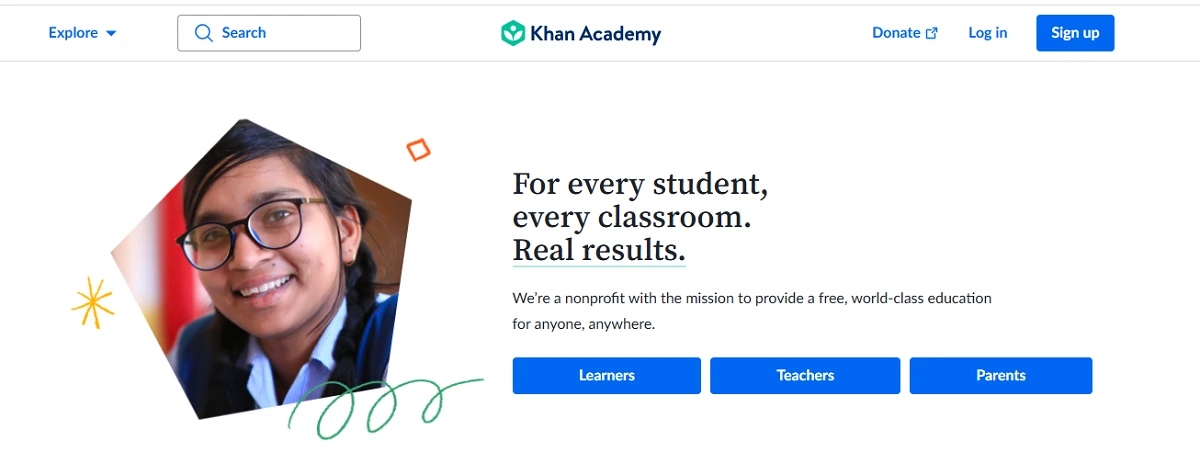
Each alternative has pros and cons. For example, MyTutor and Wyzant have large tutor pools, but tutors still charge comparable rates. Chegg offers on-demand Q&A help. Students should compare subject availability and pricing when choosing.
How it Works
For Students
Getting started with Tutorful is straightforward. Students sign up on the website or app and provide their needs (subject, level, etc.). Tutorful then matches you with suitable tutors (it uses algorithms to suggest vetted tutors in your area). You can browse tutor profiles, read reviews, and message tutors for free before booking. Once you find a tutor you like, you book a lesson at a time that fits your schedule.
Lessons can be online or in person (in-person within agreed locations, or online via Tutorful’s classroom) tutorful.freshdesk.com. Tutorful handles all the logistics: it keeps your card on file and charges after each lesson. You can reschedule or cancel according to their policies, and after the lesson you receive any homework and a chance to rate your tutor.
For Tutors
Becoming a tutor on Tutorful is free and relatively easy. You create a profile via the website or mobile app, listing your qualifications, subjects, experience, and hourly rate on. Tutorful vets tutors: you’ll need to pass their verification and background checks. Only tutors based in the UK are accepted Once approved, Tutorful will start showing your profile to students. You can then receive booking requests or applications. When a student books a lesson, Tutorful manages the scheduling and payments; you focus on teaching. Tutorful also provides features like an online classroom, lesson billing, and tracking of earnings. Payouts are processed by Stripe and deposited to your bank about a week after each lesson.
FAQs for Tutors:
-
Can I set my own fee? Yes. You choose your hourly rate when creating your profile. Tutorful recommends rates but it’s up to you.
-
How much will I earn? It varies. Tutorful says tutors average ~£22/hr. Experienced tutors charge £25–35+, while new tutors often start around £15–20. Remember Tutorful charges a service fee, so you actually receive the rate you set minus ~20–30%.
-
How many hours can I expect? There’s no fixed guarantee; it depends on demand, your subjects, and how active your profile is. Some tutors get many lessons per week, others fewer.
-
Is it easy to get students? Tutorful provides the platform and marketing, but competition is high (with thousands of tutors). To get more students: respond quickly to inquiries, ask satisfied students for reviews, and fill out your profile completely.
-
What do tutors like? Tutors appreciate that Tutorful is free to join (no subscription or signup cost) support.tutorful.co.uk handles the payments (you won’t have to chase a student for money), and even pays you if a student cancels late. They also like the built-in online classroom and scheduling.
-
What don’t tutors like? Common complaints are the high platform fee (many feel they only keep 60–75% of the lesson fee) and that standing out among many tutors can be hard. Some also mention occasional tech issues with the virtual classroom or delays in support responses.
Tutorful Company Information
Tutorful was founded in 2015 (some sources say 2014/2015) by Scott Woodley and Mark Hughes, tracxn.com, finsmes.com. It is headquartered in Sheffield, UK, tracxn.com. The mission is to provide flexible, results-oriented private tuition, matching students with vetted tutors across subjects. Tutorful has grown steadily – by 2025, it claims 196,000 matched students and 81,000 five-star reviews at tutorful.co.uk. It has raised funding (over £10M) to improve the platform and expand internationally, finsmes.com. For example, in 2021, Tutorful announced it would launch in new markets and hired additional staff. It has already expanded beyond the UK (in 2021 it launched in France and Ireland, finsmes.com) but still primarily serves English-speaking markets.
Tutorful offers 1-on-1 tutoring in a wide range of subjects. Major subjects include Maths, English, Biology, Chemistry, Physics, as well as languages (French, Spanish, German), History, Geography, Computer Science, and many more. It also covers exam/test prep (GCSE, A-level, SAT, etc.) and some higher-level topics. Unique features include: background-checked tutors (only ~1 in 8 applicants are accepted); an integrated video classroom with whiteboard and recording and a clear first-lesson satisfaction guarantee. Tutorful advertises that 90% of students improve by one grade with their tutors and emphasises a mobile app that lets tutors manage bookings and payments.
USP of Tutorful
-
Vetted Tutors: All tutors must pass checks and have at least 2 years’ experience. Only the top applicants (about 1 in 8) are accepted.
-
Easy Matching: Tutorful claims an “intelligent matching” system to connect students with suitable tutors. Students can browse and even message tutors for free before booking.
-
First-Lesson Guarantee: If the first lesson isn’t a good fit, Tutorful covers the cost of a second lesson with a new tutor. This helps students find the right tutor without losing money.
-
High Success Rates: The company states 90% of students improve by at least one grade. Also, Tutorful has collected 81,000+ five-star reviews, suggesting many users are satisfied.
-
Mobile App & Tools: The Tutorful app is highly rated (4.7/5 on Android) and lets tutors and students manage schedules, chats, and lessons on mobile. There’s an online whiteboard, screen sharing, and recording for lessons.
-
Transparent Pricing: The hourly rates you see on tutor profiles are exactly what you pay. All fees are shown upfront.
Drawbacks of Tutorful
-
High Platform Fees: Tutors report that 20–35% of each lesson fee goes to Tutorful tutorful.tenereteam.com. (Tutorful brands it a service fee on top, but the effect is that tutors earn much less than what students pay.)
-
UK-Centric: Tutorful currently operates only in the UK. International students or tutors outside the UK cannot use the platform.
-
Competition & Ranking: Because there are many tutors, it can be hard for new tutors to get noticed. Success often depends on having strong reviews and a profile ranking.
-
Mixed Support Experience: Tutorful offers email/chat support and says they aim to reply within 24 hours, but some users find response times vary.
-
Tech/Access Issues: Online lessons depend on each user’s internet connection. A few reviews mention lag or call dropouts during lessons.
-
Limited Group Options: Tutorful is built around one-to-one lessons. There are no group classes or sibling discounts, which some families might want.
Comparison with My Engineering Buddy (MEB)
Subject Focus: Tutorful is broad (schools to university general subjects) and UK-only, whereas My Engineering Buddy (MEB) specialises in engineering and STEM fields in LinkedIn. MEB advertises expert help in subjects like Mechanical, Civil, Electrical Engineering, Physics, Calculus, Statistics, Computer Science, etc. Students needing help on complex engineering homework might prefer MEB’s niche tutors.
Pricing: Tutorful’s model is commission-based (tutors keep ~60–75% of fee). MEB presents itself as a “premium yet affordable” service on LinkedIn. According to its company info, MEB charges are not cheap but offer value in LinkedIn. While exact rates aren’t public, it’s implied their pricing aims to be competitive. Being a smaller, specialized service, MEB may have more flexibility to negotiate or provide bundled help (e.g. project packages) than Tutorful’s fixed-per-hour model.
Personalization: Tutorful is a large marketplace. MEB, in contrast, is smaller (about 11–50 employees in LinkedIn.com) and focuses on individualized tutoring. MEB claims a 97% satisfaction rate and that students often give 5-star ratings on LinkedIn. Tutors at MEB may give more one-on-one attention for difficult assignments. Tutorful’s advantage is choice (many tutors to pick from) and convenience, but MEB’s advantage is a tight focus on high-quality engineering help and likely more hand-held support.
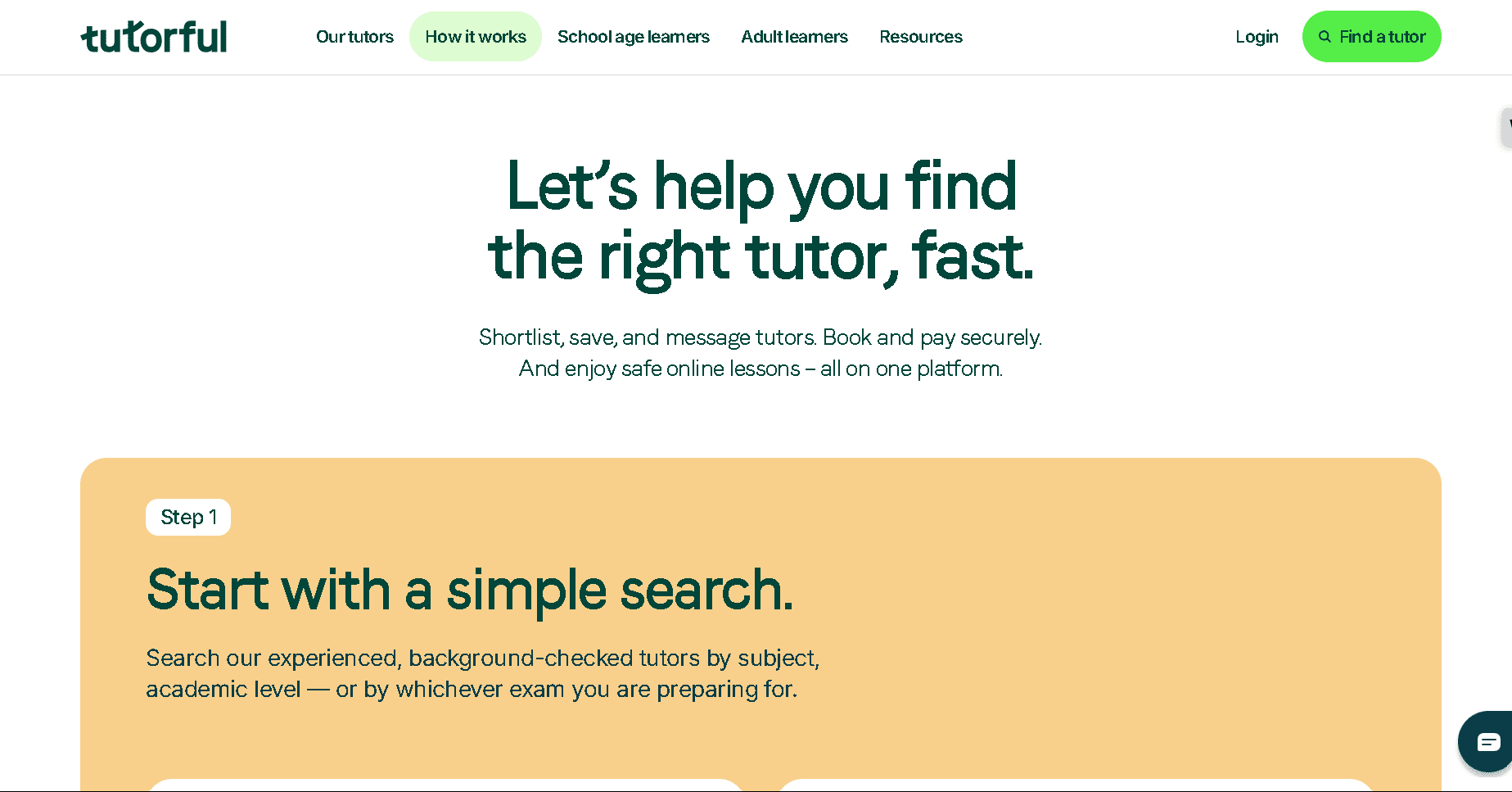
Platform & Tech: Tutorful has robust online tools (video classroom, scheduling app). MEB likely uses common platforms (e.g. Zoom, WhatsApp) for sessions. For straightforward homework help or urgent project queries, some students might find MEB’s communication more direct (email/WhatsApp support, etc.). Tutorful’s system is more structured with built-in safeguards (first-lesson guarantee, background checks, support team).
Testimonials: Many MEB users (students and parents) report positive outcomes such as improved grades and quick assistance on tough homework. For example, students often say MEB tutors explain complex topics in simple steps and are always available to help with questions. This contrasts with general feedback on Tutorful, which focuses more on the platform. (These impressions of MEB come from user comments and the company’s own reports in LinkedIn.)
Why choose MEB: If you need focused help in engineering/math (especially at college level) or want a guaranteed engineering tutor, MEB may be better. Tutorful is excellent for UK curriculum subjects and a wide tutor pool, but MEB offers subject-matter experts and potentially faster, more personalized support for technical subjects.
Customer Support and Policies
Tutorful has an online Help Center and email support. They claim to respond within 24 hours at support.tutorful.co.uk, and also offer live chat on weekdays. The policies (refund, cancellation) are clearly posted (as above). Tutorful also advertises a first-lesson satisfaction guarantee.
MEB vs. Tutorful support: Tutorful is larger, so support is via tickets/email or chat. MEB, being smaller, might offer more direct contact with their team (for example, through WhatsApp or quick email replies). MEB’s policies are not widely published, but they stress customer satisfaction and seem to work out issues case-by-case. In general, Tutorful’s standardized policies and guarantees give clarity; MEB may offer more flexibility in individual cases.
Global Reach and Localization
Tutorful only operates in the UK. All tutors and students on Tutorful are UK-based, and all services (curriculum, exams) are UK-focused. The site and support are English-only.
In contrast, MEB explicitly markets globally. MEB serves students in the US, UK, Canada, Australia, Gulf countries and more. Their tutors cover international engineering curricula and support English-speaking clients worldwide. MEB being India-based also means they can cater to multiple time zones. In short: Tutorful is UK-centric, while MEB has a more international reach.
Tutorful’s Future Plans
Tutorful has been growing steadily. In 2021 it raised more funding to enhance the platform and expand internationally, finsmes.com. It has already launched services in France and Ireland, finsmes.com. The company’s roadmap likely includes adding more tutors/subjects and tech features.
As for AI integration, there is no public announcement found on Tutorful’s plans to use artificial intelligence as of 2025. Their focus seems to be improving matching algorithms and their virtual classroom. However, given industry trends, they might explore AI-driven tutoring tools or recommendation systems in the future.
FAQs About Tutorful
How does Tutorful compare to My Engineering Buddy?
Tutorful is a UK-based marketplace for a broad range of academic subjects, while My Engineering Buddy (MEB) specialises in engineering and STEM tutoring. Tutorful operates exclusively within the UK and uses many tutors across many subjects. MEB, on the other hand, serves students in the US, UK, Canada, Australia and the Gulf with a focus on subjects like mechanical, civil, and electrical engineering, physics, calculus, etc. Tutorful’s model involves platform fees (tutors keep ~60–75%), whereas MEB advertises “value for money” and a 97% student satisfaction rate on LinkedIn.com. If you need specialized engineering help, MEB may be better; for general UK curriculum tutoring, Tutorful is a strong option.
Is Tutorful legit and safe?
Yes. Tutorful is a legitimate, well-funded UK company founded in 2015. It has a very high user rating (4.8/5 on Trustpilot) and claims over 150,000 students served. Payments are processed securely via Stripe The platform vets its tutors and offers guarantees, which gives many users confidence. There are no reports of scamming; most reviewers treat it as a reliable way to find tutors.
How much do Tutorful sessions cost?
It varies by tutor, but most sessions fall in the £20–45 per hour. Tutorful notes the typical tutor charges £15–35+ based on experience. An independent UK tutoring survey found average rates around £35–40/hr, so Tutorful’s prices are in line with the market. Remember, students pay the tutor’s rate plus a Tutorful fee. There’s no hidden fee beyond that, and you can often get a sign-up credit (e.g. £25 off your first lesson)
How do I become a Tutorful tutor?
Sign up on Tutorful’s website or mobile app (it’s free to create a profile). You’ll enter your qualifications, subjects, and rates. Tutorful requires tutors to be UK-based and passes all applicants through background checks. Once approved, your profile goes live. Students can then book lessons with you. Tutorful handles lesson scheduling and payments, and you get paid via bank transfer typically 7 days after each lesson.
Are Tutorful lessons online or in-person?
Both options are available. Students and tutors can meet through Tutorful’s own online classroom (with video, whiteboard, etc.), Tutorful’s platform is optimized for online lessons. However, in-person tutoring is also allowed in the UK. You and your tutor can agree on a location (your home, the tutor’s home, library, etc.) for face-to-face lessons, tutorful.freshdesk.com. Either way, booking and payment go through Tutorful.
Does Tutorful offer a free trial or guarantee?
Tutorful does not give a free unlimited trial. However, there is a first-lesson guarantee: if you’re not happy with your first tutor, Tutorful will pay for your second lesson with a new tutor. In effect, that means you can try a different tutor for free if the first match doesn’t work. This is the closest thing to a “free trial” they offer.
What if I need to cancel or get a refund for a lesson?
If you need to cancel a lesson, do it online through your account as soon as possible. Cancelling >24 hours before is free support. Cancelling <24 hours before may incur 50–100% of the lesson fee (tutor’s choice). If the tutor waives part of the charge, you still pay a £5 cancellation fee. If the tutor cancels or you both agree to a refund, you can request it on the site. Tutorful then processes refunds within a few days. The key is to follow Tutorful’s procedure (request a refund in your dashboard) and allow a couple of days for it to complete.
Conclusion
Tutorful is a solid platform for finding UK-based tutors. Its strengths are verified, high-quality tutors, a large selection of subjects, and useful features like an integrated classroom and mobile app. The 90% student success claims and high Trustpilot score suggest many students benefit from Tutorful’s service. On the downside, Tutorful can be costly (20–30% platform fees) and is limited to the UK. Some tutors find the competition tough.
As an alternative, My Engineering Buddy (MEB) stands out for technical subjects and a global reach in LinkedIn. MEB emphasises personalised help in engineering/math and boasts very positive student feedback (97% satisfaction in LinkedIn.com). For engineering students or parents needing focused support with projects or homework, MEB may offer more specialized attention. For general K-12 or college subjects in the UK, Tutorful remains a convenient, trusted choice. Choose the platform that best fits your subject needs, budget, and desired level of personalisation.
******************************
This article provides general educational guidance only. It is NOT official exam policy, professional academic advice, or guaranteed results. Always verify information with your school, official exam boards (College Board, Cambridge, IB), or qualified professionals before making decisions. Read Full Policies & Disclaimer , Contact Us To Report An Error

